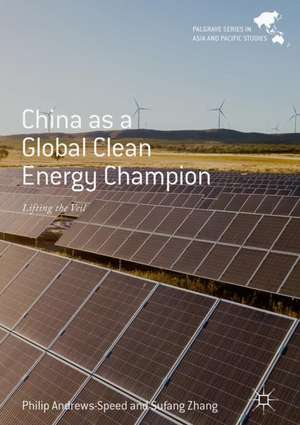China as a Global Clean Energy Champion: Lifting the Veil: Palgrave Series in Asia and Pacific Studies
Autor Philip Andrews-Speed, Sufang Zhangen Limba Engleză Hardback – 18 ian 2019
Din seria Palgrave Series in Asia and Pacific Studies
-
 Preț: 382.95 lei
Preț: 382.95 lei -
 Preț: 386.99 lei
Preț: 386.99 lei - 18%
 Preț: 783.50 lei
Preț: 783.50 lei - 15%
 Preț: 642.03 lei
Preț: 642.03 lei - 18%
 Preț: 890.54 lei
Preț: 890.54 lei - 18%
 Preț: 729.53 lei
Preț: 729.53 lei - 15%
 Preț: 645.60 lei
Preț: 645.60 lei - 15%
 Preț: 526.18 lei
Preț: 526.18 lei - 9%
 Preț: 750.41 lei
Preț: 750.41 lei - 15%
 Preț: 642.36 lei
Preț: 642.36 lei - 15%
 Preț: 699.28 lei
Preț: 699.28 lei - 18%
 Preț: 887.68 lei
Preț: 887.68 lei - 18%
 Preț: 730.97 lei
Preț: 730.97 lei - 15%
 Preț: 697.65 lei
Preț: 697.65 lei - 18%
 Preț: 728.74 lei
Preț: 728.74 lei - 18%
 Preț: 729.53 lei
Preț: 729.53 lei - 15%
 Preț: 698.47 lei
Preț: 698.47 lei - 18%
 Preț: 732.40 lei
Preț: 732.40 lei - 18%
 Preț: 725.26 lei
Preț: 725.26 lei
Preț: 533.39 lei
Preț vechi: 627.51 lei
-15% Nou
Puncte Express: 800
Preț estimativ în valută:
102.06€ • 106.85$ • 84.45£
102.06€ • 106.85$ • 84.45£
Carte tipărită la comandă
Livrare economică 07-21 aprilie
Preluare comenzi: 021 569.72.76
Specificații
ISBN-13: 9789811334917
ISBN-10: 9811334919
Pagini: 270
Ilustrații: XVII, 339 p. 17 illus.
Dimensiuni: 148 x 210 mm
Greutate: 0.58 kg
Ediția:1st ed. 2019
Editura: Springer Nature Singapore
Colecția Palgrave Macmillan
Seria Palgrave Series in Asia and Pacific Studies
Locul publicării:Singapore, Singapore
ISBN-10: 9811334919
Pagini: 270
Ilustrații: XVII, 339 p. 17 illus.
Dimensiuni: 148 x 210 mm
Greutate: 0.58 kg
Ediția:1st ed. 2019
Editura: Springer Nature Singapore
Colecția Palgrave Macmillan
Seria Palgrave Series in Asia and Pacific Studies
Locul publicării:Singapore, Singapore
Cuprins
1. Introduction.- 2. China as a Global Clean Energy Champion: Goals and Achievements.- 3. Transitions, Institutions and Public Policy.- 4. Governance in China.- 5. Low-Carbon Electricity.- 6. Low-Carbon Electricity Technology, Innovation, Manufacturing and Internationalisation.- 7. Fossil Fuels.- 8. Energy Efficiency and Conservation.- 9. The Water-Energy-Food Nexus.- 10. Carbon Pricing.- 11. Conclusions.
Recenzii
“China as a Global Clean Energy Champion: Lifting the Veil adds an interesting and important set of insights … . It provides a rare peek at what is going on behind the scenes of Chinese energy transition. Aside from area scholars, it is also widely accessible to non-specialist readers, and does a great job of writing to a broader audience. Readers will have a better understanding of China and its energy transition, and of its thoughts and practices … .” (Xiao Wang and Xiufeng Zhao, Pacific Affairs, Vol. 94 (4), December, 2021)
Notă biografică
Philip Andrews-Speed is a Senior Principal Fellow at the Energy Studies Institute, National University of Singapore, Singapore. He has 35 years in the field of energy and resources, starting his career as a mineral and oil exploration geologist before moving into the field of energy and resource governance. Until 2010 he was Professor of Energy Policy at the University of Dundee and Director of the Centre of Energy, Petroleum and Mineral Law and Policy. His main research interest is the political economy of energy and resource governance. Recent books include China, Oil and Global Politics (with Roland Dannreuther) and The Governance of Energy in China: Transition to a Low-Carbon Economy.
Sufang Zhang is Professor at the School of Economics and Management, North China Electric Power University (NCEPU), China. Before joining the NCEPU in 1993, she worked in provincial government as a project officer in charge of international aid programmes. Her research field focuses on energy policy, China’s renewable energy policy in particular. She has directed and participated in many renewable energy research projects supported by China’s central and local government, as well as international organizations such as the Energy Foundation China. Recent research projects include Institutional Constraints to the Renewable Energy Development in China.
Sufang Zhang is Professor at the School of Economics and Management, North China Electric Power University (NCEPU), China. Before joining the NCEPU in 1993, she worked in provincial government as a project officer in charge of international aid programmes. Her research field focuses on energy policy, China’s renewable energy policy in particular. She has directed and participated in many renewable energy research projects supported by China’s central and local government, as well as international organizations such as the Energy Foundation China. Recent research projects include Institutional Constraints to the Renewable Energy Development in China.
Textul de pe ultima copertă
This book considers China’s role as a rising champion of clean energy and document the policy decisions and actions which have underpinned this evolution. It considers the construction of the world’s largest fleets of advanced coal-fired power stations, wind farms and solar photovoltaic arrays, examines sustained efforts to reduce national GDP intensities of energy and CO2 emissions, and assesses the rhetoric of government announcements on national policy and international commitments, including the Thirteenth Five-year Plan for Energy (2016-2020). The book notably considers the factors that have supported these achievements, including the availability of large amounts of capital, the role of state-owned companies with soft budgetary constraints, and many forms of indirect support from local governments. It also explores the obstacles to reaching the formal goals of reducing air pollution and CO2 emissions as well as the costs and unintended consequences of these policies, and identifies those parts of the energy supply chain where the governance of energy has been less effective in terms of energy efficiency and environmental protection.
Caracteristici
Presents an overview of China’s energy sector, applying the analytical framework to wider aspects of governance in China Explores the clean electricity sector in China, both the energy industry and the manufacturing industry Examines the wider context of China’s clean energy, namely fossil fuels, energy efficiency and the resource nexus. Chapter 10 assesses the outlook for carbon pricing in China
